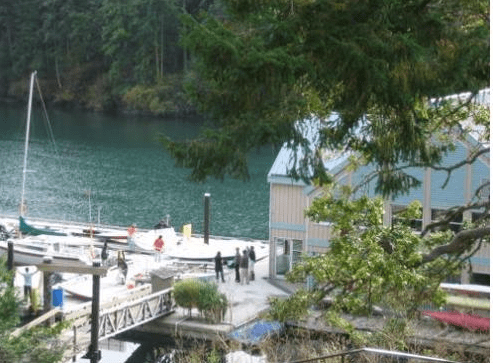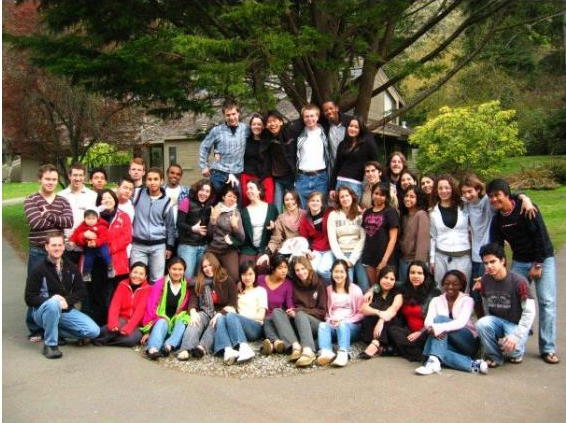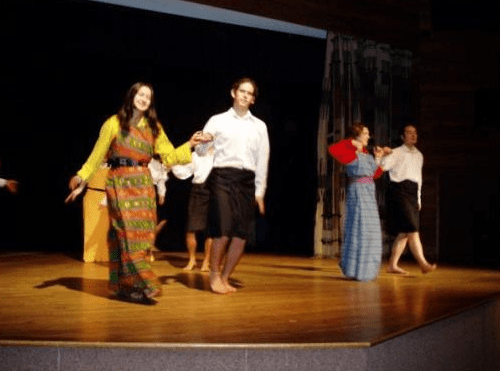One Day In Our Far Away Island by Cassandra Gomes-Hochberg, Brazil/Israel
At the age of sixteen, I moved to a boarding school in Canada. As a boarding school ‘graduate,’ I might guess that one of the two options came to your mind when I say I went to a boarding school: either my parents hate me or I am extremely rich. Or both. Fortunately, neither of the options are the case. I went to this boarding school with a scholarship, where every single one of the two hundred students had a scholarship as well and came from a different country. I was there representing my home country, Brazil, whereas my friends were representing Canada, Bhutan, The Netherlands, Zimbabwe, Fiji, and so on. You pick a country, and I can probably tell you I have a friend there, or an interesting fact about it, or an organization that fights for the rights of a specific minority in that country.
But that’s not part of the story, not this one. This story is not about the time I lived in an island in Canada with people that came from every imaginable circumstance and country, such as refugee camps, royal families, rural artic zones or downtown Hong Kong. Neither is this a story about how I shared a room with another three people, each one from a different continent. Nor it is a story about how day by day, class by class, meal by meal, longing by longing in two years you realize that there isn’t really a difference between you and your Bhutanese roommate, and that the way you expected a person from Peru to act has nothing to do with who, you later found out, she is.
This is a story about one day, on our island, when the tsunami and earthquake alarm rang. We were told we had one minute to get to the emergency boats that would take us to mainland. Our island and our school were about to be hit. We had finished our morning classes, had lunch in the cafeteria and arrived in our rooms. Right in those thirty minutes that we had to drop our bags down and update our roommates about anything we had seen in class, the deafening alarm shouted, and hysterical teachers ran around shouting we had twenty seconds to leave the house and go straight to the safety boats – the same boats we had gotten inside in the first week of class, as safety training in case a tsunami approached the island.
To be honest, I have no idea of the thought that crossed my mind the moment I heard the alarm. I knew it would be tragic, but I cannot record specific insights. I took my passport and a coat that laid on my bed, and keeping an eye on my roommates, we all ran towards the boat that would take us away.
When we approached the bay, the alarm stopped. We all looked at each other, some teachers still in shock. The few teachers that knew told us it was another training, but a different type of training. We went back to the dorm area, divided into groups, and sat in different rooms to discuss what had happened. What did you feel, was one of the questions. Some people got angry and asked the teacher how could they do that to us, how could they fool us. Some people cried, saying they thought we would all die. Others were laughing nervously, saying that even though they ran down the bay screaming and calling out to their mothers, they knew it was a game.
Next question, where were your roommates? Some people were still hugging their roommates in fright. Others hadn’t known the whereabouts of their roommates for the past two weeks, who had just been in the internet room the entire time. I was still angry at my roommate, with whom I had a mother-daughter relationship – or as she liked to say, a granddaughter-grandma relationship – because she had ran way too fast while holding my hand and I tripped and almost fell.
Next question, what did you bring? We all looked around at each other’s hands. Blankets, coats (remember, we were in Canada, and when you are a Brazilian or a Nigerian, the first thoughts that popped in your mind were that you might die of cold). Passport, a picture of my younger brother, my father’s last letter, an edition of the New York Times. The things people managed to bring were as diverse as their nationalities. “The Koran,” said Ahmed subtly, as we all still laughed about the warm socks someone had brought with them.
“The Koran,” said Waad. The Koran. No matter the level of religiosity, from the Maldives to Iraq to Canada, every single Muslim student, in the moment they heard the life threatening alarm, had reached for their Koran and brought it with them to the boat. I was perplexed by it. My sixteen year old self, who was raised by almost atheist parents, had never before met someone at school out of the Jewish-Christian boundaries of society, was perplexed to see that my Muslim friends, each one coming from a completely different part of the world than the other, had the same thought of holding on to their book.
Your question might be, so what? They brought the Koran, so? What happens next in this story? Nothing really happened after. We went back to our rooms, talked extensively about what we thought, what would happen if it was true, who cried, who thought of their parents or death. I asked if someone had brought the Bible or the Torah. One guy here had, the other girl over there. I went to each one of my Muslim friends and asked them why had they picked up the Koran. They looked at me and some of them didn’t really see any sense in my question. It was as natural as running to the boat, as natural as for me to pick up a coat and go.
Even though ten years have passed, I still remember my friends and their Korans, and I still cannot fully understand what that moment meant to me. I know it meant something – it turned around the tables, it switched my understanding. In that moment, religion became something else, something apart from what our grandparents do, or the different foods we ate on different holidays, or the repeated prayers in a language I couldn’t understand. It became a moment, a book, a movement of my sixteen year old friends reaching for their Koran, their only thought, the only hope inhabiting my friends’ minds when they thought they would be hit by a tsunami. As I said, something that stuck to my mind and I still can’t fully understand. And that was just one more afternoon in our far-away island.





Leave a Comment
Want to join the discussion? Feel free to contribute!